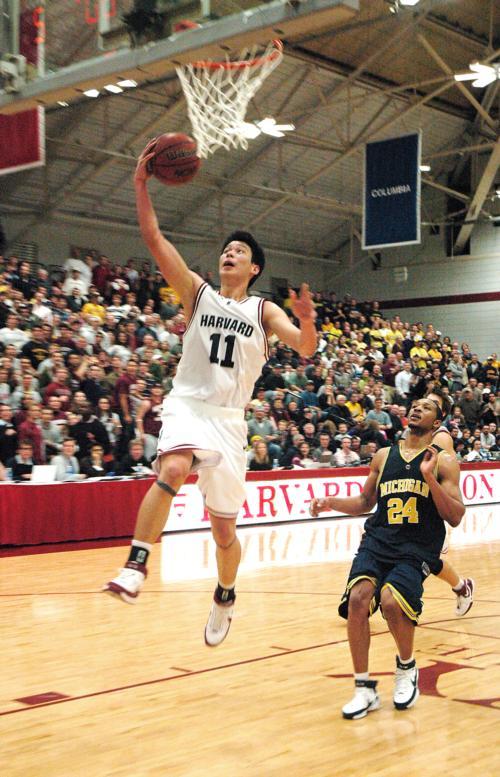
News
Cambridge Residents Slam Council Proposal to Delay Bike Lane Construction

News
‘Gender-Affirming Slay Fest’: Harvard College QSA Hosts Annual Queer Prom

News
‘Not Being Nerds’: Harvard Students Dance to Tinashe at Yardfest

News
Wrongful Death Trial Against CAMHS Employee Over 2015 Student Suicide To Begin Tuesday

News
Cornel West, Harvard Affiliates Call for University to Divest from ‘Israeli Apartheid’ at Rally
Late Lead Slips Away in Loss
Quakers overcome rejections of two big men to outrebound Harvard

PHILADELPHIA—For the first time in years, the Harvard men’s basketball team entered The Palestra with a swagger, looking to take advantage of a struggling Penn team and do what it hadn’t done since 1991: win on the Quakers’ home court.
Though the Crimson charged back from multiple deficits, leading as late as with 2:43 remaining in the game, Harvard (6-13, 1-2 Ivy) missed three consecutive three-point attempts to end the game as Penn (6-12, 1-0) squeaked out a 73-69 victory on Friday night.
Quaker freshman Tyler Bernardini led all scorers in his first Ivy League game, pouring in 20 points, while captain Brad Unger and sophomore guard Dan McGeary both recorded Crimson career highs, finishing with 17 and 15, respectively.
“I thought it was a tremendous effort—tremendous effort by both ballclubs,” Harvard coach Tommy Amaker said. “I was really pleased in a lot of ways with the way that our kids kept their poise and battled—and we certainly had to.”
The game was won on the boards and lost at the free-throw line. The Quakers dominated the glass, out-rebounding the Crimson, 44-32. Penn’s total included 15 offensive boards, a factor that contributed significantly to the Quakers’ 20 second-chance points.
“I just think their team was tougher than we were on the backboard,” Amaker said, adding later, “I think that was the difference.”
After a sluggish start, Harvard’s offense played aggressively, challenging the Penn defense with a steady diet of dribble penetration. The Crimson’s quickness forced the Quakers to foul often, putting Harvard in the double bonus just under 14 minutes into the first half.
But time and time again, the Crimson failed to convert from the charity stripe, shooting only 18-of-28 on the night.
“Certainly, the foul shooting, I was disappointed in us,” Amaker said. “We shot 18-for-28—we got to the line 28 times. To me, that’s the difference: that stat there, and the rebounding margin.”
Although Penn led by as much as eight just six minutes into the second half, the Crimson held the Quakers without a field goal over the next four minutes and eventually drew even at 56.
The teams traded buckets for the next several minutes, with neither team leading by more than four points. While Penn captain Brian Grandieri settled into the paint, clearing out his defenders for a series of short-range finishes, sophomore guard Jeremy Lin and Unger hit answering threes.
But after two free throws from Lin gave his team a 67-66 lead, Harvard unraveled.
A McGeary foul put the Quakers in the double bonus, and Grandieri sank both free throws to reclaim the lead for Penn. Unger fouled out on an offensive foul in the lane on the ensuing Crimson possession, producing a Harvard turnover.
The Quakers took advantage of the smaller Crimson lineup, with its frontcourt players establishing themselves in the lane and earning lay-ups on the next two possessions—including one on an offensive rebound—sandwiched around a missed three-pointer by junior guard Drew Housman. Jack Eggleston’s put-back pushed Penn ahead, 72-67, with just 1:14 remaining.
“It’s hard to guard, you know, a 6’3, 245 down in the post,” Grandieri—listed at 6’4, 210 pounds—said with a laugh, adding later, “When little guys try to defend you, you’ve got to take advantage of what you’ve got.”
But after scoring at one end, Eggleston blundered just seconds later at the other, logging the Quakers’ 10th team foul away from the ball to send Harris to the charity stripe for two shots. The forward converted both attempts to cut the lead to three and then blocked Grandieri on the other end.
After a Penn timeout, Housman forced a Bernardini turnover, allowing Amaker to call his players to the sideline and draw up a play. But Housman missed a pressured three-point attempt from the wing and Harris failed to stay inbounds as he scrambled for the rebound, giving the Quakers the ball with just five seconds remaining.
Grandieri sunk one of two free throws to put the game out of reach.
“Yeah, we tried to get that—I thought they did a nice job with it,” Amaker said of the missed three-point attempt. “I wish he would have, in hindsight, obviously, but—we got a decent shot…Percentage-wise, he’s a very good three-point shooter for us, but they did a nice job of defending, getting a hand up.”
Penn dominated much of the first half. While Unger’s inside presence and McGeary’s play from beyond the arc kept Harvard close early, the Crimson struggled to stop Bernardini, who finished the frame with 13 points on 4-of-5 shooting. Harvard missed nine of 11 three-point attempts and six of 15 from the free-throw line. The Quakers led by as much as nine, but the Crimson finished the half on a 6-1 run to draw within 35-31.
—Staff writer Karan Lodha can be reached at klodha@fas.harvard.edu.
Want to keep up with breaking news? Subscribe to our email newsletter.
